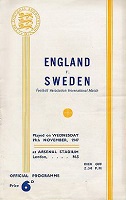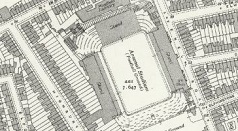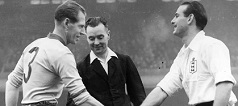|
|
|
 flg.jpg) "ENGLISH
XI LACKS STAMINA"
Daily Herald "ENGLISH
XI LACKS STAMINA"
Daily Herald |
 Officials Officials |
England |
FIFA ruling on substitutes |
Sweden |
Referee
William E.
Webb
Glasgow |
Teams were presented to
the Crown Prince of Sweden, Oscar Fredrik Wilhelm Olaf Gustaf Adolf.
|
|
red flag
Linesmen
yellow
flag |
Frederick W.
Chadwick
Leicester |
Harry Frederick
Parvin
(1903)
Sussex |
|
|
|
flg.jpg) England
Team England
Team |
| |
|
Rank |
No official ranking system established;
ELO rating 3rd to 4th |
Colours |
The 1946 home
uniform -
White collared jerseys, blue shorts, red socks. |
|
P 12th of eighteen, W 9 - D 2 - L 1 - F 47 - A 12. |
Captain |
George Hardwick |
Manager |
Walter Winterbottom, 34 (31 March 1913), appointed as FA national director of coaching/team manager on 8 July 1946; |
|
12th
of 13, W 9 - D 2 - L 1 - F 47 - A 12. |
P 12th
of 139, W 9 - D 2 - L 1 - F 47 - A 12. |
|
|
Team chosen by Selection Committee headed by Arthur Drewry
following the Ireland match on 5 November, in Liverpool. |
flg.jpg) England
Lineup England
Lineup |
|
|
one change
to the previous match
(Langton>Matthews) |
league position
(5 November) |
|
|
|
Swift, Frank V. |
33
328 days |
26 December 1913 |
G |
Manchester City FC (FL 9th) |
12 |
12ᵍᵃ |
 |
13th keeper to face a penalty kick |
|
2 |
Scott,
Lawrence |
30
210 days |
23 April 1917 |
RB |
Arsenal
FC (FL TOP) |
12 |
0 |
|
3 |
Hardwick,
George F.M. |
27
290 days |
2 February 1920 |
LB |
Middlesbrough FC
(FL 13th) |
12 |
0 |
|
4 |
Taylor, Philip H. |
30
62 days |
18 September 1917 |
RHB |
Liverpool FC
(FL 16th) |
3 |
0 |
|
final app 1947 |
|
5 |
Franklin,
Cornelius |
25
299 days |
24 January 1922 |
CHB |
Stoke
City FC (FL 20th) |
12 |
0 |
|
6 |
Wright, William A. |
23
286 days |
6 February 1924 |
LHB |
Wolverhampton
Wanderers FC (FL 6th) |
12 |
0 |
|
7 |
Finney,
Thomas |
25
228 days |
5 April 1922 |
OR |
Preston
North End FC (FL 2nd) |
10 |
8 |
8
   |
Mortensen, Stanley H. |
26
177 days |
26 May 1921 |
IR
|
Blackpool FC
(FL 3rd)
|
5
|
9
|
|
the
142nd (9th post-war)
brace,
the 42nd (fifth post-war)
hattrick scored |
9 |
Lawton, Thomas |
28
44 days
|
6 October 1919
|
CF
|
Notts County FC
(FL3s 19th) |
20 |
21
 ¹ ¹ |
 |
11th
successful penalty kick (22nd overall) |
17th
County player to represent England |
|
|
|
|
the eighteenth player to reach the 20-app milestone |
10
 |
Mannion,
Wilfred J. |
29
187 days |
16 May 1918 |
IL |
Middlesbrough FC (FL
13th) |
12 |
8 |
|
11 |
Langton,
Robert |
29
72 days |
8 September 1918 |
OL |
Blackburn
Rovers FC (FL 19th) |
7 |
1 |
|
unused substitute: |
Harry Johnston (Blackpool FC (FL 3rd)). |
|
team changes: |
When the team was chosen on 5 November, Tommy Lawton was still a
member of the Chelsea FC team (FL 15th),
his move to Notts County FC being announced on 13 November.
On the morning of this match,
Finney replaced
Stan Matthews (Blackpool FC
(FL 3rd)) at outside-right, as Langton took up the
outside-left position. Matthews was suffering with a groin injury. |
|
records: |
Tommy Lawton
converts England's first successful post-war penalty kick.
For the
third time (first for nine years), England have completed eight
matches in a single calendar year.
They have also won their last
fourteen home friendly matches, extending the record that began back
in 1923. |
|
goalscoring
records: |
For the third successive 'playing' Tommy Lawton ends the year as the
yearly top goalscorer, again, sharing the honour, this time with Stan
Mortensen. Lawton's nine goals came across eight matches, whereas
Mortensen's was five. Mortensen scored two hat-tricks to Lawton's one. |
|
|
|
2-3-5 |
Swift -
Scott, Hardwick -
Taylor,
Franklin, Wright -
Finney,
Mortensen, Lawton, Mannion, Langton. |
|
Averages: |
Age |
28
years 101 days |
Appearances/Goals |
10.6 |
3.9 |
|
|
|
 Sweden
Team Sweden
Team |
| |
|
Rank |
No official ranking system established;
ELO rating 11th |
Colours |
Yellow jerseys with blue collars, blue shorts, blue
socks with yellow hoops. |
|
Captain |
Erik Nilsson |
Selection |
Selection committee
headed by J. Rudolf E.
Kock, 45 (29 June 1901)
|
Trainer:
George Sidney Raynor,
40
(13 January 1907) |
 Sweden
Lineup Sweden
Lineup |
|
|
Lindberg, Torsten G.A. |
30
219 days |
14 April 1917 |
G |
IFK Norrköping |
6 |
11ᵍᵃ |
|
2 |
Nordahl, Knut E.A. |
27
310 days |
13 January 1920 |
RB |
IFK Norrköping |
10 |
1 |
|
3 |
Nilsson, Erik |
31
105 days |
6 August 1916 |
LB |
Malmö FF |
14 |
0 |
|
4 |
Andersson, Sune I. |
26
270 days |
22 February 1921 |
RHB |
AIK
Stockholm |
6 |
1 |
|
5 |
Nordahl, Bertil |
30
116 days |
26 July 1917 |
CHB |
Degerfors IF |
7 |
0 |
|
6 |
Emanuelsson, Rune |
24
42 days |
8 October 1923 |
LHB |
IFK
Göteborg |
7 |
0 |
7
 |
Mårtensson, Malte H. |
31
56 days |
24 September 1916 |
OR |
Halsingborgs IF |
15 |
3 |
|
8 |
Gren, J.
Gunnar |
27
19 days |
31 October 1920 |
IR |
IFK
Göteborg |
28 |
18 |
 |
eighth
penalty against scored
(18th overall) |
|
|
|
|
9 |
Nordahl, N. Gunnar |
26
31 days |
19 October 1921 |
CF |
IFK Norrköping |
24 |
31 |
|
10 |
Liedholm, Nils E. |
25
42 days |
8 October 1922 |
IL |
IFK Norrköping |
7 |
5 |
|
11 |
Nilsson, Stellan |
25
181 days |
22 May 1922 |
OL |
Malmö FF |
11 |
4 |
|
unused substitutes: |
not known |
|
team notes: |
Emanuelsson replaced Malmö FF's Kjell Rosén at left-half on 14 November. Nilsson replaced
AIK
Stockholm's Stig Nystrom at outside-left the day before the match.
The
three Nordahl's, Bertil, Gunnar and Knut,
were brothers. |
|
Committee Chairman Pette Kock played against England
in 1923. |
|
The team trained at Chelsea FC's Stamford Bridge in Fulham prior to
the match. |
|
|
|
2-3-5 |
Lindberg
-
K.Nordahl, E.Nilsson -
Andersson, B.Nordahl, Emanuelsson -
Mårtensson,
Gren, G.Nordahl, Liedholm, S.Nilsson. |
|
Averages: |
Age |
27
years 294 days |
Appearances/Goals |
12.3 |
5.7 |
|
|
|
|
News |
|
"SWEDEN TO SEND TEAM TO ENGLAND"
"F.A. Council meeting in London yesterday
announced next football season's programme of international matches, which
include a visit to England by Sweden, who for the first time in England,
will play an international." -
Birmingham Daily Gazette, Tuesday, 11 February 1947.
|
|
Match Report
by Mike Payne |
|
 England
dominated the first half
of this match at Highbury and would have won by more goals had
they not faded so badly after the interval to allow Sweden to come
right back into the game. England
dominated the first half
of this match at Highbury and would have won by more goals had
they not faded so badly after the interval to allow Sweden to come
right back into the game.
England were quickly into their stride and after 13 minutes,
brilliant work by Wilf Mannion set up their first goal. He dribbled
out to the right before splitting the Swedish defence with a brilliant
reverse pass which let in Stan
Mortensen to score.
After 20 minutes, England added a second from the penalty spot.
Mortensen burst through to take Tommy Lawton's headed pass but was
brought down in the box. Lawton scored from the spot-kick.
Sweden then hit back and Gunnar Nordahl had scored after a free-kick
had caught England badly positioned. This was only a momentary lapse
by the home side and they were soon back on top. Lindberg made some
fine saves but was powerless to stop Mortensen making it 3-1 after
another pass by Lawton.
The midfield mastery of Mannion,
Mortensen, Billy Wright and Phil Taylor was superb during the first
half and, but for Lindberg's brilliance, especially in two saves from
Mannion, England would have been in an unassailable position.
As it was, the second half was a much different story. The edge went
from England's play and the half barely started when George Hardwick
was desperately heading a shot off his goalline. Sweden were beginning
to take control as England faded and they really put the pressure on
when Gren scored from a penalty to make it 3-2.
For a while it
seemed as though they might equalise but England withstood the
pressure well and near the end a piece of sheer brilliance by
Mortensen clinched the match. He picked up the ball and set off on a
magnificent 40-yard run before ending it with a deadly left-foot shot.
After the break England were certainly made to think by the
gutsy Swedish display.
|
|
Match Report
by Norman Giller |
|
Sweden, including the famous Nordahl
brothers - Gunnar, Bertil and Knut - pulled back to 3-2 after
England had powered into a three-goal lead. Stan Mortensen settled
it with a classic goal to complete his hat-trick, beating three
defenders in a run from the half-way line before firing in an
unstoppable 20-yard shot. The game was billed as being for the
unofficial championship of Europe at a time when the Swedes,
coached by former Bury winger George Raynor, were rated one of the
world's leading football nations. Stan Mortensen was in
magnificent form and might have had four goals had he not been
upended in the penalty area when shaping to shoot in the
first-half. After England's bad recent record from spot-kicks,
Tommy Lawton volunteered to take it and scored England's first
goal from a penalty since the war. The newspapers ran a story
before the match that the Swedes were on a course of pep-pills.
Their coach George Raynor later confided that they were just
sugar-based pills, but that they had a great psychological effect
on his players. Most of the Swedes were amateurs, and that
following summer they won the Olympic final in London with some
delightful football. Gunnar Nordahl was an exceptional
centre-forward, who along with Nils Lindholm later starred with AC
Milan.
|
|
Match Report
as reported in the F.A. Yearbook
1948-49, page 24 |
|
For
their next match, against Sweden at the Arsenal Stadium, on
November 19, England were without Matthews, which meant Finney had
to be moved over to Matthew's place and his position at
outside-left taken by Langton (Blackburn Rovers). The remainder of
the team were the same as in the matches against Wales and
Ireland. England, as was expected, defeated Sweden, but their 4—2
victory was not so easily gained as had been anticipated, the
result not being clinched until Mortensen scored two minutes
before full-time.
In the first half England were successful
everywhere and their brilliant forward line swept again and again
through the Swedish half. Thirteen minutes from the start
Mortensen scored from a pass from Mannion, and seven minutes later
Lawton scored from a penalty kick after a foul on Mortensen. G.
Nordahl replied with a quick goal from a free kick before England
were properly in position, but Mortensen added a third goal to
England's total from a pass by Lawton. At half-time the tally was
thus 3—1. Sweden had shown no signs of equaling the home
team in offence, though their goalkeeper had made some splendid
saves. The few forays made by their forwards showed style but
little menace and did nothing to prepare the spectators for the
surprises that were to follow.
In the second half the fire
went out of the English attack so that the Swedish forwards, well
supplied by offensive half-back play, began to find gaps. Their
positional play was of the first rank and they gained and kept
control of the game in midfield as frequently in the second half
as England had in the first. Immediately after the kick off Swift
was beaten and a goal was only saved by Hardwick's head. Soon
afterwards Gren scored to bring the the score to 3—2. Sweden made
great efforts to force a draw, but two minutes from the end
Mortensen carried out a long, dribbling run and scored left footed
his third and England's fourth goal.
|
In
Other News....
|
It
was on
20 November 1947 that
Princess Elizabeth married Philip Mountbatten at Westminster
Abbey. The groom was awarded the title of Duke of Edinburgh
just prior to the service and his 21-year-old bride was to
become Her Majesty Queen Elizabeth II, just over four years
later. |
|
|
|
|
Source Notes |
TheFA.com
Original newspaper reports
Svenskfotboll.se |
|
Rothman's Yearbooks
Mike Payne's England: The Complete Post-War Record
Norman Giller, Football Author |
|
|
cgi |

.jpg)


